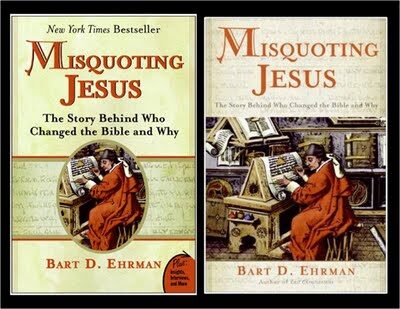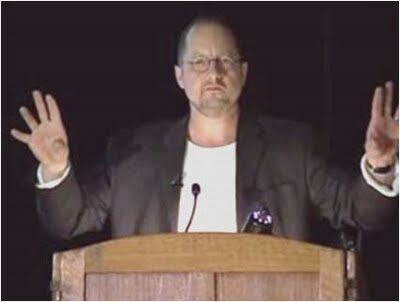Considering that his book “Misquoting Jesus” explored the issue of variant readings in New Testament manuscripts it may be surprising to some that Bart Ehrman’s book itself contains millions and millions of variants.
Following are some examples of the variants:
On p. 13 reference is made to “Timothy LeHaye and Philip Jenkins” as the authors of the Left Behind series of novels. However, the authors of the series are Tim LaHaye and Jerry Jenkins. Thus, error 1. Tim has never published as “Timothy,” error 2. his last name is not LeHaye but LaHaye and error 3. Jenkins’s first name is not Philip but Jerry.
On p. 110 error 4. “Timothy” is used as LaHaye’s last name.
In the index Timothy’s name is error 5. again spelled as “LeHaye.”
On p. 110 Hal Lindsey’s name is error 6. misspelled as “Hal Lindsay.”
On p. 70 Desiderius Erasmus is error 7. misspelled as “Desiderus Erasmus.”
On pp. 48, 90 scriptio continua is error 8. misspelled as “scriptuo continua.”
On p. 91 parablepsis is errors 9. and 10. written as “periblepsis” twice.
On p. 192 error 11. the citation should refer to Acts 17:30 and not to Acts 17:27.
On pp. 12 and 110 errors 12. and 13. LaHaye’s name is spelled as “LaHay” and Hal Lindsey’s name is again misspelled.
The Evangelical Textual Criticism blog further notes:
error 14. “Despite the comments on p. 91 the normal nomen sacrum for πνευμα is not πμα but πνα.” Also,
error 15. “Codex Sinaiticus does not support the presence of ‘and he was taken up into heaven’ (Luke 24:51) despite the rather confused assertion on p. 169 that it does.”
Lastly, note that while it is said that a book should not be judged by its cover error 16. the book’s cover has upside down Hebrew on it. In fact, why is Hebrew on the cover of a book that analyses Greek manuscripts?
Now, if you are paying attention—or are you like me and simply cannot afford to pay attention? :o)—you may be thinking 1) that is only 16 errors, 2) they are mostly merely misspellings, 3) they do not affect the contents of the text and certainly do not affect any major point which the book seeks to make.
As for 2) and 3); thank you for noticing as this is precisely, word for word, how many of us feel about Bart Ehrman’s criticisms of the New Testament manuscripts.
As for 1) how do 16 equal my assertion of there being millions and millions of variants? Well, let us learn some methodology, the sort that allows Ehrman claim, “Put it this way: There are more variances among our manuscripts than there are words in the New Testament.”
I do not know how many copies Misquoting Jesus has sold but it is reported that “Within the first three months, more than 100,000 copies were sold.”
The way it works is as simple as it is deceptive: you multiply the 16 variants by how many times they have been reproduced. As the 16 have been reproduced 100,000 (in three months alone) you multiply these and so the total of variants in Misquoting Jesus equals: 1,600,000.
And that, boys and girls, is how Bart Ehrman manages to make sensational claims that gain him notoriety and quite a few shekels.
Let us move beyond Bart Ehrman’s books and delve into his persona and a little more about his modus operandi. Reference to his persona is not intended as an ad hominem but an attempt to either dispel or augment the Ehrmanian myth.
The mythos is that Bart Ehrman was the consummate conservative Christian who merely followed the evidence were it lead, uncovered variants in the New Testament manuscripts and made an unemotional scholarly decision to denounce Christianity and encourage others to do likewise.
Yet, “he and his family were casual in their faith” he was “an uncertain teenager” who “felt an emptiness settle over him” and eventually had a “bona fide born-again experience” when he became a Christian.1
It was the mid-1980s, the Ethiopian famine was in full swing. Starving infants, mass death. Ehrman came to believe that not only was there no evidence of Jesus being divine, but neither was there a God paying attention. “I just began to lose it,” Ehrman says now, in a conversation that stretches from late afternoon into the evening.
“It wasn’t for lack of trying. But I just couldn’t believe there was a God in charge of this mess . . . It was so emotionally charged. This whole business of ‘the Bible is your life, and anyone who doesn’t believe it is going to roast in hell.’”
He now tells his captive college audience,
You shouldn’t think something just because you believe it. You need reasons. That applies to religion. That applies to politics . . . just because your parents believe something isn’t good enough.
To begin with let us consider the Ethiopian famine with the view that there is no God; what to do? The key question (which I have already asked with regards to Charles Templeton and The Misanthropic Principle) is: what did Bart Ehrman do about it? Did he travel there in order to help? Did he donate goods? Did he donate money? Did he even attend a Live Aid concert? Did he donate one second of time or one single penny? In other words; since God, for all practical purposes, does not exist humans are the only ones who can help other humans and so what did Templeton and Ehrman do? I certainly do not know but I imagine that a good guess would be nothing. Nothing except giving in to emotional reasons for rejecting God—“I just began to lose it…It was so emotionally charged.” Also, note that “I just couldn’t believe” is what Richard Dawkins would rightly label an “argument from personal incredulity” as what we can or cannot believe is of no relevance to what actually is.
Moreover, note that “roast in hell” and “just because your parents believe something isn’t good enough” are atheist talking points. For one “roast in hell” is emotive and misleading and the other comment is generic and certainly does not apply to me, for example. In fact, when atheists boast of majority atheists in countries such as Sweden you can simply state, “just because their parents do not believe something isn’t good enough; they are atheists because they were born in an atheist country.”
Well, now Bart Ehrman is a “happy agnostic” as he happily drives his BMW convertible, happily lives in “a lovely house in the countryside” where he happily lives with his second wife as he happily enjoys “an ever-growing career.” Such are the perks of besmirching Christianity within the safety, comfort, freedom and prosperity of living in a country premised upon Judeo-Christian principles.
And yet, “That emptiness he felt as a teenager is still there” but not to worry as “he fills it with family, friends, work and the finer things in life.” As for the afterlife; another atheist talking point, “I think you just cease to exist, like the mosquito you swatted yesterday.” Hope? Nope!
Now let us consider Ehrman as teacher/activist,
He’s often on CNN, the Discovery Channel, National Geographic, a scholar amused by “taking something really complicated and getting a sound bite out of it.”
This is very telling as one of the major criticisms of his books is that he does not present his case or his field of research in a manner which is methodological enough. This is why his scholarship based conclusions are not new or surprising to anyone who has studied that field but his controversial and emotive conclusions are so very appealing to those who are desperately seeking excuses for rejecting God.
Moreover, when I watch CNN, the Discovery Channel and National Geographic on such issues I always think to myself, “I know who the top guys are in the field who are on the other side of Ehrman; why are they never interviewed? Why is it always an indifferent (or left leaning) college professor? Why Ehrman and the [anti] Jesus Seminar but no conservatives?”



